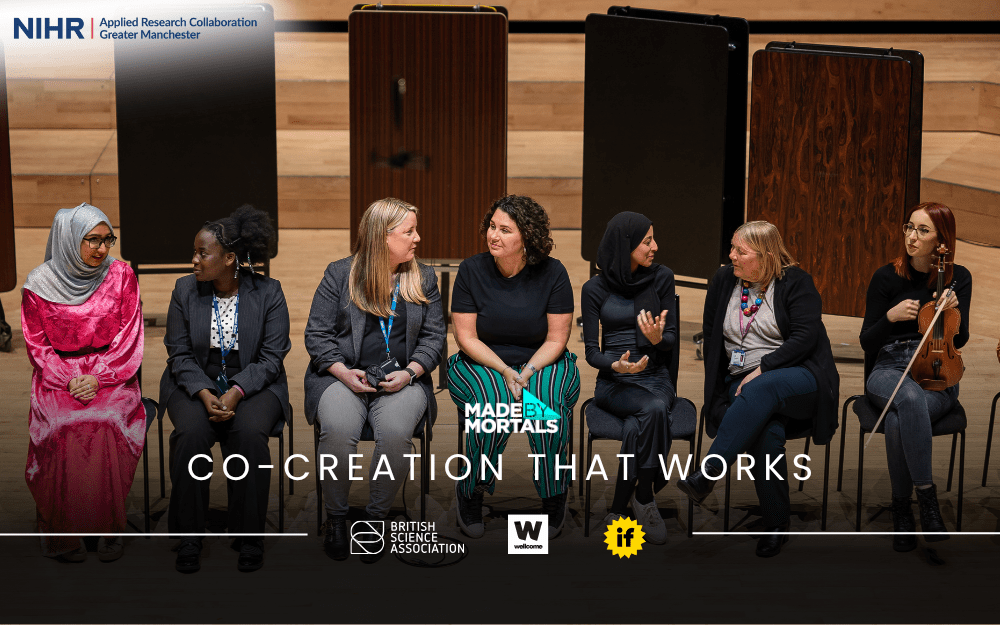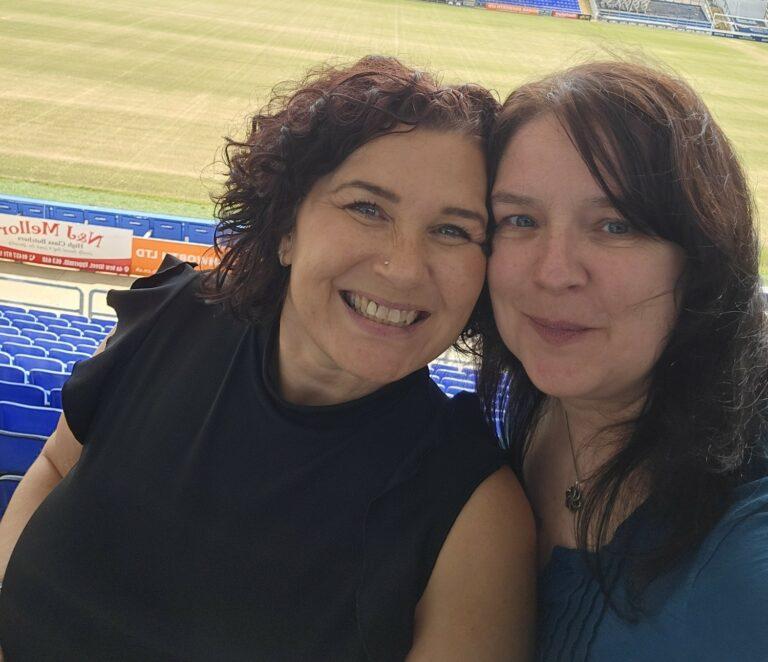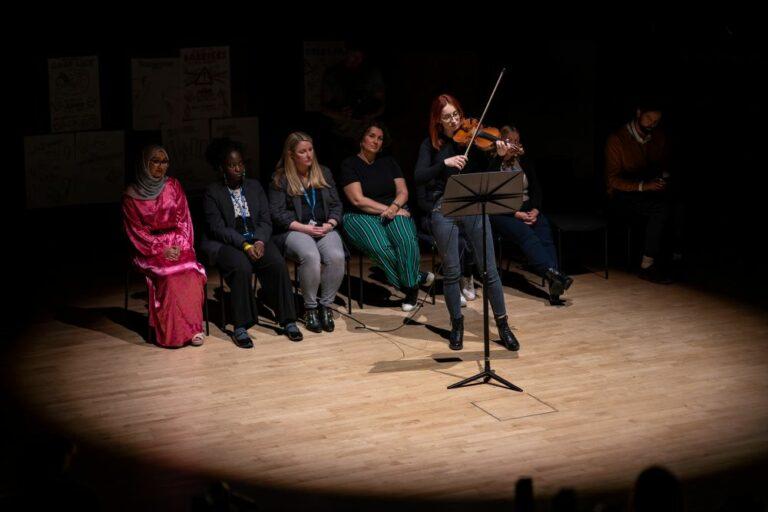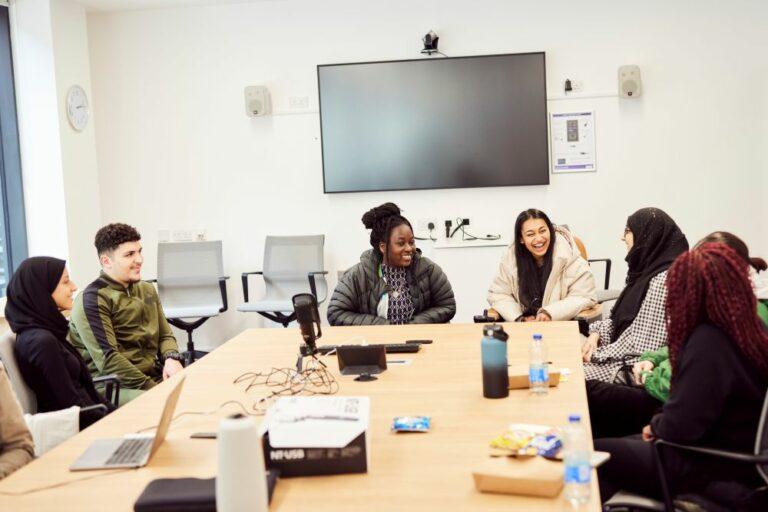
Our Relationship Manager Tess meets Aneela and Sue from the Applied Research Collaboration in Greater Manchester to explore how creativity, coproduction, and trust can transform research partnerships.
I’m sitting in a café just around the corner from Manchester University, catching up over lunch with Sue and Aneela from ARC-GM — that’s the Applied Research Collaboration in Greater Manchester. They’re part of the National Institute for Health Research (NIHR), supporting health and care research that’s rooted in real communities, responding to the needs of local people and the systems that serve them.
Over flatbreads and roasted veggies, we share how we are and what’s been happening in our lives and work over the last few months. I’ve known Aneela and Sue since I started at Made By Mortals (MBM) as the Relationship Manager nearly two years ago, but their work with MBM goes back much further. There’s a real sense of ease between us now — the kind that comes from doing things together, learning from each other, and eating together more than once.
They’ve brought MBM in on all sorts of research projects over the years — shows, interactive workshops, short films, live events. And, brilliantly, they keep finding new ways for us to collaborate. The work we’ve created together has felt good. Important. It’s reached people. It’s reached service providers and policy makers. But I’m curious, and once the plates have been cleared and fresh drinks ordered, I lean in and ask them: Why does this collaboration work so well?

Aneela and Sue start by sharing how they first met MBM. This was before I started at MBM so I’m really interested to hear about it. Aneela remembers being at an MBM event early on, watching how our team worked — relational, positive, creative, kind — and how central the lived experience group was to everything that was happening. She noticed how much they seemed to benefit just from being involved. That stayed with her. So when ARC-GM received funding to take a more creative approach to working with young people, they knew they wanted MBM to be involved.
What ARC GM and MBM created together became Hidden: Adam’s Story. A fictional audio story created by the young people, supported by our writers and musicians, about a character called Adam who’s struggling with his mental health. The story was brought to life as a live show and discussion at the Royal Northern College of Music, and was then transformed into an interactive film that went on to tour local colleges.

Growth mindset & embracing of the unknown
But they didn’t know it was going to take this shape at the beginning. It was an organic journey that grew as the project went on. Aneela and Sue share that it was this embracing of the unknown, coupled with curiosity and a can do approach that made the process so good. Aneela called it a ‘growth mindset’, the belief that abilities, ideas, and relationships can develop through curiosity, openness, and a willingness to learn from the process — not just the outcome.
Coproduction
Coproduction was key for us, Sue says. The power balance in research isn’t always right, so it really mattered that MBM didn’t just come in and deliver a finished piece. Instead, they joined us in a process where everyone — the young people, ARC-GM, MBM, the artists — brought their own expertise, had a role, and could shape, share and own what we made together.
There was a sense that both ARC GM and MBM were in it together making it happen as a team, Aneela adds, not just the creative sessions, but practicalities too. Aneela talks about how they jointly recruited participants, found venues and solved problems quickly on the phone.
“You came with your own relationships and connections and we came with ours and we fused those together so then it became much better overall.” – Sue
Participatory arts approach
As we talk, it becomes clear just how much the participatory arts approach brought the inclusive values of both organisations to life. Building characters, music and stories together created a space where everyone was on equal footing. Everyone had something to bring. Everyone’s ideas counted. The young people could see they’d been listened to — their words were in the script, their ideas in the music. They felt ownership over the final piece, and they felt proud. They wanted to invite people to the event, to share the audio with friends and family.
Because the whole thing unfolded in an organic way, Aneela and Sue say there were plenty of surprises — how powerful the live music felt at the event, how useful and easy to share the audio pieces turned out to be long after the project finished. And maybe best of all, the group stayed together. They stayed involved. They became a strong advisory group, continuing to shape research — and now they tell others: if you’re starting something like this, begin with a creative project like the one we made together.

Embodied values
It was this project — the relationship built with the MBM team, the coproduction, the person-centred way of working, and the creative outputs that were actually useful — that made Aneela and Sue want to work with us again. Even small things stood out, like the fact they didn’t need to tell us it mattered to stay and eat when invited by the community group. We just did.
This project set the stage. It showed what was possible. It built trust. And it got all of us thinking about where else this kind of approach could work — what other spaces it could open up. What stuck most wasn’t just what we made, but how we made it. The values weren’t something we talked about — they were something people felt. They were shown, in action.
Communities don’t always trust researchers
I’m really starting to get a picture of how the creative process embodies values and I wanted to know if it brought any other advantages. Sue says they often work with communities that don’t naturally trust researchers so bringing someone in who isn’t from that world, and who turns up with headphones and microphones and musical instruments, shifts things. It knocks barriers down. Aneela says we can only hear people if they are talking, and creative work opens a space that encourages people to speak and share their stories in ways other settings can’t. She explained how using a fictional character is part of this as it can create safety. You’re talking about something real, but it doesn’t feel exposing — you’re not being asked to share personal details. And yet, people do share. They open up in ways they didn’t expect to, because they’re talking about the character, not themselves.
Aneela says she likes how flexible this approach is. On other projects together we’ve adapted existing audio stories to explore new scenarios. We worked with Awakening Minds in Rochdale on mental health conversations, engaged four community groups across Greater Manchester discussing virtual wards, and co-created A Mile in Their Shoes — an interactive workshop where researchers step into the shoes of community champions to better understand their role and challenges.
“It was one the nicest experiences I have ever had. I think the best thing that they did was they came back and they gave us feedback. They made it such a positive experience for us because they respected our community, our time and our people were re-imbursed which is a big thing. To know that you are heard, to know that someone is listening to you and acknowledging you.”
Fehmina Parveen, Awakening Minds
Essential ingredients
Before we go off to our next meetings and emails, I ask Aneela and Sue if we could sum it all up, all the things we’ve talked about, into some essential ingredients for good research partnerships. What’s needed to make this kind of work possible? They don’t hesitate. Mutual respect, they say, for what everyone brings to the table. Coproduction values need to be part of the whole process. Building trust through actions, not just words, both between partners and with lived experience groups. Creativity is key as well, offering something different, an experience people haven’t had before. And a growth mindset — being open to where the work might go and not needing to have all the answers right from the start.
When I get back to the office, I share with the team the conversation I’ve just had and we talk about how much we’ve learned from the collaboration too. Aneela and Sue’s support has gone far beyond the scope of our projects—they’ve joined us at events, backed our groups, and even introduced us to wider community research networks across Greater Manchester. Sharing the work we’ve created back with the communities, hearing their pride in it, and them knowing it’s made a difference has been a real highlight. For us, it’s also been a chance to learn more about working with community languages, access, and inclusivity. We’re excited to keep building on this partnership!

Five key takeaways:
- Build in coproduction from the start
Involve everyone — community members, researchers, creatives — as real partners. It’s not about giving everyone the same role, but making sure people get what they need to take part fully. That way, power feels more balanced and the work really reflects people’s lives and creativity. - Adopt a growth mindset and embrace the unknown
Don’t lock everything down at the beginning. Allow projects to grow organically, adapt to new ideas, and see the process as valuable in itself, not just the final product. - Use creative and participatory approaches to break down barriers
Storytelling, music, and fictional characters can create safe spaces for people to share their experiences and perspectives. This helps build trust, especially with groups that may not naturally trust institutions or researchers. - Show your values through what you do
It’s not just words — small actions like sharing responsibility, eating together, staying flexible, and visibly including people’s ideas in the work shows respect and helps people feel seen and valued, and makes them want to work with you again. - Focus on sustainability and legacy
Design projects so they can have lasting impact — whether that’s materials that can be reused (like audio stories), relationships that continue (like advisory groups), or skills that communities can carry forward.
Looking for ways to bring lived experience into your work?
Sign up for our Members Area to access audio stories, training materials, and workshop guides—all themed around key health & social care topics. Start exploring today!
For more information about how Made By Mortals can support your project including a quote, please email admin@madebymortals.org or call 0161 804 2078
